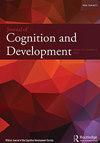Age-related Changes in Task Switching Costs in Middle Childhood
IF 2.1
2区 心理学
Q3 PSYCHOLOGY, DEVELOPMENTAL
引用次数: 0
Abstract
ABSTRACT Cognitive flexibility refers to the ability to rapidly and accurately switch between tasks. It is regarded as a core dimension of executive functions and has been reported to improve during childhood and into early adulthood. For its evaluation, the task-switching paradigm is widely used. Switching between tasks or response sets imposes a series of costs on performance (i.e., mixing costs, global switch costs, local switch costs). There is less evidence analyzing switching performance in children than in other age groups, and few studies have specifically analyzed switching costs only in school-age children. In the present study, we aimed to analyze age-related changes in task switching in children aged 9–12 years old. We considered year-to-year changes in performance, specifically in response time based mixing costs, global switch costs, and local switch costs. To do this, we used a task switching measure to evaluate 231 children in Argentina, aged 9–12 years (M age = 10.94, SD = 0.88) who were aggregated into four age groups (9, 10, 11, and 12 years old). Results show consistent mixing costs, global switch costs, and local switch costs at each age. However, we did not find age-related differences in the magnitude of such costs. These results suggest that both the ability to maintain and select between two tasks, and to switch from one response set to another could be considered relatively constant during this period.儿童中期任务转换成本的年龄相关变化
认知灵活性是指在不同任务之间快速准确切换的能力。它被认为是执行功能的一个核心方面,据报道,在童年和成年早期,它会得到改善。对于其评价,任务转换范式得到了广泛的应用。在任务或响应集之间切换会给性能带来一系列成本(即混合成本、全局切换成本、本地切换成本)。与其他年龄组相比,分析儿童转换表现的证据较少,而且很少有研究专门分析学龄儿童的转换成本。在本研究中,我们旨在分析9-12岁儿童任务转换的年龄相关变化。我们考虑了性能的逐年变化,特别是基于混合成本、全局切换成本和本地切换成本的响应时间变化。为了做到这一点,我们使用任务转换测量来评估阿根廷9 - 12岁的231名儿童(M年龄= 10.94,SD = 0.88),他们被分为四个年龄组(9岁、10岁、11岁和12岁)。结果显示,混合成本、全球转换成本和本地转换成本在每个年龄段都是一致的。然而,我们没有发现这些成本的大小与年龄相关的差异。这些结果表明,在这段时间内,维持和选择两个任务的能力,以及从一个响应集切换到另一个响应集的能力都可以被认为是相对恒定的。
本文章由计算机程序翻译,如有差异,请以英文原文为准。
求助全文
约1分钟内获得全文
求助全文
来源期刊

Journal of Cognition and Development
Multiple-
CiteScore
4.00
自引率
0.00%
发文量
29
期刊介绍:
The Journal of Cognition and Development is the official journal of the Cognitive Development Society (CDS). Some CDS members are concerned with basic research or theory; others focus on policy issues and practical applications. The range of interests includes cognitive development during all stages of life, and we seek to understand ontogenetic processes in both humans and nonhumans. Finally, their interests encompass typical as well as atypical development, and we attempt to characterize both biological and cultural influences on cognitive change and continuity.
 求助内容:
求助内容: 应助结果提醒方式:
应助结果提醒方式:


